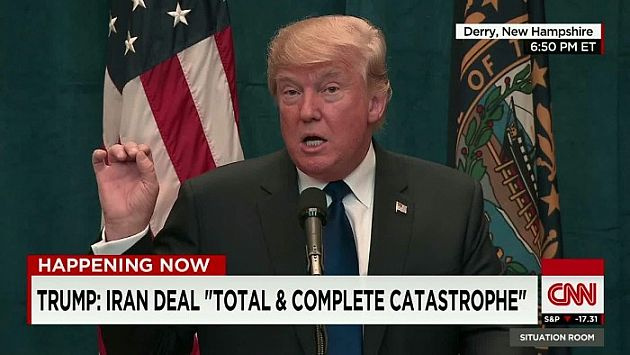Trump’s Iran Dilemma: The road ahead

The latest Iran report by the UN's atomic agency, re-confirming Iran's full compliance with the nuclear accord, has clearly complicated the present efforts by the Trump administration to denigrate the deal and, perhaps, to decertify it to the US Congress next month, thus raising new questions about the future of both the accord and the nature of US's Iran policy.
Regarding the latter, it is now patently obvious that much like its predecessors essentially since the Islamic revolution of 1979, the Trump administration is deeply wedded to the so-called containment strategy -- that has resulted in a robust direct military presence in Persian Gulf and a whole network of other security arrangements with the conservative oil sheikhdoms of the region, ostensibly to protect them against the menace of Iranian power. That policy, also called "dual containment" while Saddam Hussain was around, has of course gone through its adjustments and incremental changes over the years, yet the overall frame of reference for guiding the US's approach toward the post-revolutionary Iran has remained basically the same. It denotes a fundamentally hostile approach that leans in favor of a zero-sum approach, despite the existence of several areas of shared and or parallel interests with Iran, e.g., with respect to Afghan security, narco-traffic, and anti-terrorism. The latter are in a state of uneasy, and even contradictory, co-existence with a plethora of unmatched and even conflicting interests and concerns between Tehran and Washington, thus making it difficult to prognosticate the future of bilateral relations, particularly since the often wild swing of tensions are directly contributed to by a host of Iran's competitors in the region, manipulating Washington against Iran.
But, another complicating factor is the nuclear accord, the Joint Comprehensive Plan of Action (JCPOA), which underscores America's "smart diplomacy" and, simultaneously, a thorn on the side of the broader Iran containment strategy, in light of the agreement's unhinging of Iran from the international sanctions and paving the way for normal Iran trade relations with the rest of the world, thus enhancing Iran's regional influence. The problem for Washington has been then how to continue with a successful Iran containment strategy when, in certain respects, the nuclear agreement undercuts that strategy?
One solution offered by the so-called Iran hawks in Washington is to scrap the JCPOA and return to the status quo ante for the sake of an uncomplicated and straightforward containment strategy relying on the arsenal of both soft and hard power. The problem with this 'solution' is that it may create more problems and headaches for the US at an inconvenient time when Washington has its plate full with the North Korea crisis and the natural disaster at home. Iran has signaled its intention to resume full nuclear activities "within hours" if Washington scraps the nuclear deal, thus guaranteeing the resumption of the nuclear crisis that bedeviled the international community for over a decade. An unnecessary crisis of choice would then be foisted on the horizon, with Europe and China and Russia most likely unwilling to sign onto US's U-turn on the agreement, given the absence of any viable justification.
Indeed, the latest IAEA report on Iran will be a principal point of reference, and benchmark, come this October when President Trump notifies the Congress on the status of the JCPOA. Having delegated the monitoring and, in effect, the certification of the nuclear deal in the hands of the IAEA, per both the agreement and the subsequent UN resolution that put a seal of approval and legitimacy on it, the US has theoretically marginalized itself in the technical process, which is why the agency's report carries an enormous political and diplomatic weight. Iran's conventional missile tests, utilized by the White House to critique the JCPOA, will not be a convincing issue to decertify the JCPOA, given the agreement's basic value in blocking off all pathways to nuclear weapons. Conceivably, the Trump administration can refuse to take any action, thus leaving it to the Congress to chart US's Iran policy, which is anathema to any US executive branch unwilling to forfeit an important foreign policy issue to the legislative branch. It is more likely, then, that the Trump administration will certify again, for the third time, since January 2017, albeit with new caveats indicating a more robust Iran containment approach, in order to appease the president's hawkish supporters. But, should Trump cave in to the latter and either refuse to certify the JCPOA or fail to take any action, then it will likely re-open the Iran nuclear crisis in slow motion.

